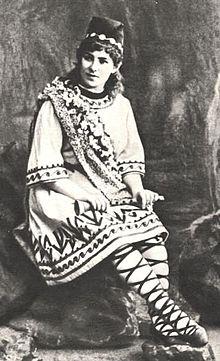Evgenia Zbrueva
Evgenija Zbrueva | |
|---|---|
 Evgenija Zbrueva as Lel in Sněhurka (1894) | |
| Born | Evgenija Ivanovna Zbrueva 26 December 1867 (or January 7, 1868) Moscow |
| Died | 20 October 1936 Moscow |
| Other names | Evegeniya Zbrujewa, Evegenia Zbroueff, Yevgenia Zbruyeva |
| Occupation | Singer |
Evgenija Ivanovna Zbrueva (December 26, 1867 or January 7, 1868 – 20 October 1936), in Russian Евге́ния Ива́новна Збру́ева, was a Russian contralto opera singer.
Early life
[edit]Zbrueva was born in Moscow, the daughter of composer Pyotr Bulakhov. (Her surname came from her mother's first husband, because her parents were not legally married.) She trained as a singer at the Moscow Conservatory, under E. A. Lavrovskaya.[1]
Career
[edit]Zbrueva was a contralto in the Moscow Imperial Opera at the Bolshoi Theatre from 1894, and with the Mariinsky Theatre from 1905 until 1918, including appearances in Paris[2] and Munich.[3] In 1915 she was appointed Professor of Singing at Petrograd Conservatory. She was named an Honored Artist of the USSR in 1922.[4]
Zbrueva's repertoire included roles in Glinka's A Life for the Tsar (1894), Saint-Saëns' Henry VIII, Rimsky-Korsakov's The Legend of the Invisible City of Kitezh and the Maiden Fevroniya (1907) and The Snow Maiden (1894),[5] Tchaikovsky's Cherevichki,[6] Mussorgsky's Khovanshchina,[7] Ruslan and Lyudmila,[3] Prince Igor, and Carmen.[4][8]
Personal life
[edit]Zbrueva died in Moscow in 1936, aged 67 years. Archival recordings of Zbrueva have been included on several anthology recordings, including Singers of imperial Russia. Volume III (1992, Pearl Records),[9] Great singers at the Mariinsky Theatre (1994, Nimbus Records),[10] Great Singers in Moscow (1996, Nimbus Records),[11] and Rimsky-Korsakov performed by his contemporaries (1999, Russian Disc).[12]
References
[edit]- ^ Macy, Laura Williams (2008). The Grove Book of Opera Singers. Oxford University Press. pp. 547–548. ISBN 978-0-19-533765-5.
- ^ "Le Festival Russe à Paris". L'Art Moderne (in French). 27: 166. 26 May 1907.
- ^ a b "Madame Zbroueff". Musical Courier. 57: 9. July 8, 1908.
- ^ a b Barnes, Harold. Singers Of Imperial Russia Vol. 3 - CD Booklet. Pearl CDs.
- ^ Hugill, Robert (23 November 2016). "From social realism to fairy tale: the background to Rimsky Korsakov's opera The Snow Maiden". Planet Hugill. Retrieved 2021-04-09.
- ^ Seaman, Gerald R. (2019-08-23). Pëtr Il'ich Tchaikovsky: A Research and Information Guide. Routledge. ISBN 978-1-317-30309-1.
- ^ Taruskin, Richard (2016-04-27). Stravinsky and the Russian Traditions, Volume Two: A Biography of the Works Through Mavra. Univ of California Press. pp. 45, note 31. ISBN 978-0-520-29349-6.
- ^ Giroud, Vincent (2015). Nicolas Nabokov: A Life in Freedom and Music. Oxford University Press. p. 16. ISBN 978-0-19-939989-5.
- ^ Singers of imperial Russia. Volume III. Volume III., Wadhurst, E. Sussex, England: Pearl, 1992, OCLC 31446969, retrieved 2021-04-09
- ^ Nimbus Records, Great singers at the Mariinsky Theatre., 1994, OCLC 34623582, retrieved 2021-04-09
- ^ Various Artists (1996), Great Singers In Moscow, Internet Archive, Nimbus Records Limited, retrieved 2021-04-09
- ^ Rimsky-Korsakov performed by his contemporaries., Moscow: Russian Disc, 1999, OCLC 43993435, retrieved 2021-04-09
External links
[edit]- Portrait of Yevgenia Zbrueva as Ratmir in M. I. Glinka’s opera “Ruslan and Ludmila” (1897)[dead link], at Google Arts and Culture
- Zbrueva singing Vanya's aria from A Life for the Tsar, recorded in 1913, on YouTube
